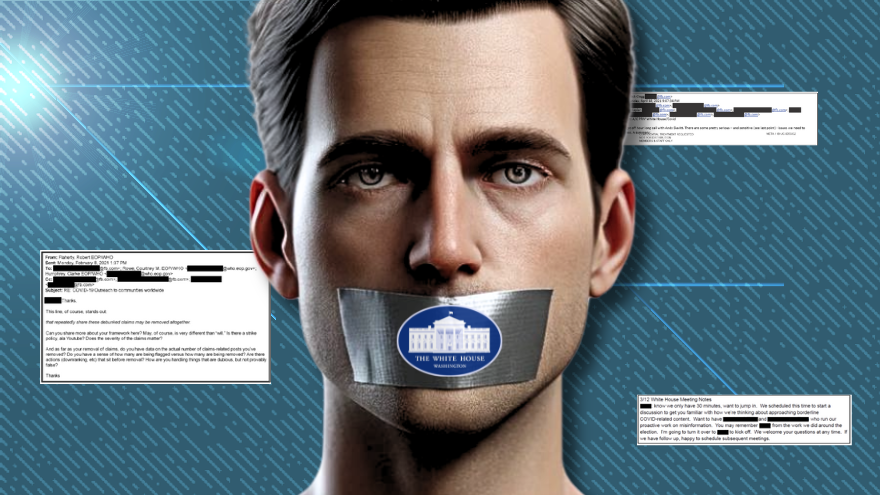Facebook, Google/YouTube, and Amazon were heavily leaned on by the Biden administration to change content moderation policies, as well as censor true information, satire and books disfavored by the administration. The House report corroborates several other investigations highlighting similar First Amendment abuses by the Biden administration. “The First Amendment prohibits the government from ‘abridging the freedom of speech.’ Thus, ‘any law or government policy that reduces that freedom on the [social media] platforms . . . violates the First Amendment,’” the committee said of its interim report. The 98-page report from the Select Subcommittee on the Weaponization of the Federal Government states that the Biden administration engaged in “serious violations of the First Amendment” and provides a roadmap to help lawmakers weigh what legislative remedies may be needed to reign in the executive branch. After reviewing tens of thousands of emails, the committee concluded that Facebook, Google/YouTube, and Amazon changed content moderation policies because of White House pressure. Much of the censorship effort began during the first days of the new administration, with government officials pressuring Big Tech companies to censor information related to COVID-19 and COVID vaccines. “The Biden campaign had previewed for months that removing content disfavored by the left would be a top priority,” the report says. Facebook An internal Facebook email explains that the company implemented new content moderation policies because of interference from the Biden administration, the report states. The White House squeezed Facebook so tightly that in July 2021, President Joe Biden publicly accused the comapny of killing people, as detailed in the report. “They're killing people. ... Look, the only pandemic we have is among the unvaccinated. And they're killing people,” Biden told reporters at the time, during remarks about alleged misinformation. Facebook altered its policies on COVID-19, COVID vaccines, vaccines in general, lab leak theory, and whether the virus was manmade, specifically in response to “tense conversations with the new [Biden] administration,” as explained in an email sent by Mark Zuckerburg, CEO of Meta, Facebook’s parent company. Zuckerburg expressed dismay over efforts by the White House to dictate content moderation policies, telling members of his leadership team, “This seems like a good reminder that when we compromise our standards due to pressure from an administration in either direction, we’ll often regret it later.” In March 2021, internal documents reveal that Facebook employees had what they believed to be a “productive” meeting with the White House, only to have the administration berate the company days later, accusing Facebook of “hiding the ball” and lacking an adequate “sense of urgency.” Andrew Slavitt, White House Sr. Advisor for COVID-19 Response, sent an email to Facebook because he believed his questions were not being sufficiently answered. He blatantly threatened the company, ominously warning the government had “been considering our options on what to do about it.” Google/YouTube The Biden administration’s interactions with Big Tech companies about content moderation also included YouTube, with efforts to remove videos it considered to contain “misinformation,” according to the report. White House officials repeatedly expressed concern over YouTube’s failure to censor “borderline content,” which is content that does not violate any of the company’s policies, but that government officials wanted taken down anyway. Rob Flaherty, White House Director of Digital Strategy, emailed the company to ask how the company could better “crack down on vaccine misinformation” and discuss “ways the White House (and our COVID experts) can partner in your product work.” Following months of criticism for not censoring non-violative content, in September 2021, YouTube began sharing internal policy proposals with the Biden White House to gain feedback on what content to censor. Leaders within the company felt pressure to cave to the government’s censorship demands because it needed “to work closely with the administration on multiple policy fronts,” as stated in an internal email. Amazon The Biden White House also extended its pressure campaign to the world’s largest online bookstore for selling books questioning the safety or efficacy of vaccines, the report states. “Facing pressure from the White House, Amazon reacted quickly, implementing a new policy within a week that would add restrictions to anti-vaccine books,” the committee said. At one point, an Amazon employee messaged colleagues within the company about the Amazon bookstore’s content moderation policy change, stating, “[T]he impetus for this request is criticism from the Biden Administration about sensitive books we’re giving prominent placement to.” As early as March 2021, Amazon staffers were deliberating how to handle White House pressure. The head of Amazon’s Books team approved a new policy to apply a “Do Not Promote” label to books deemed anti-vaccination. The request was deemed a “high priority” in order to address the “negative feedback” from Biden’s Coronavirus Taskforce. Emails confirm the reason for the policy change: “the impetus for this request is criticism from the Biden Administration about sensitive books we’re giving prominent placement to,” even concluding with a warning that the request “should be handled urgently.” Context Throughout the document, lawmakers list myriad examples of blatant government-pressured censorship, which could potentially open up a series of actions against the executive branch and the companies involved. The First Amendment prohibits the government from restricting freedom of speech, and generally does not apply to private actors. However, private companies can be held liable for First Amendment violations if they censor speech on behalf of the government. Lawmakers say that mere investigations are not enough, and that “legislative reforms are needed.” Members of the committee have introduced the Free Speech Protection Act and the Censorship Accountability Act, which aim to hold federal employees accountable for violating Americans’ First Amendment rights.A U.S. House of Representatives committee has just released a new report detailing a pervasive and persistent campaign by the federal government to use Big Tech companies to censor Americans.
Big Tech /
House Report Details Biden Administration’s Online Censorship Efforts
'The Biden campaign had previewed for months that removing content disfavored by the left would be a top priority'

*For corrections please email [email protected]*
